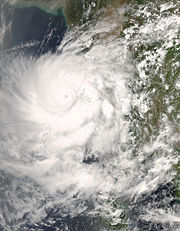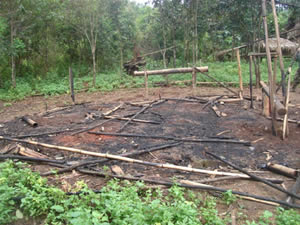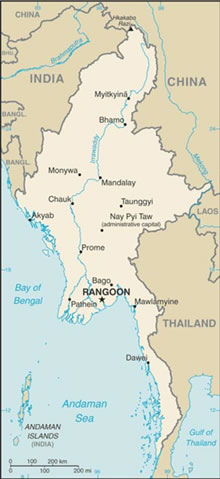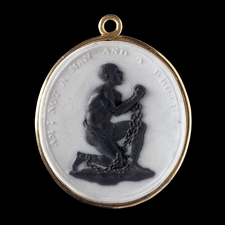
|
How Do We Love Burma?
A Natural Disaster Exposes a Government's War Against Its Own People
A guest essay by physicist Brad Keister. Brad and his wife Katie worship at Washington Community Fellowship, on Capitol Hill in Washington, DC.
For Sunday June 22, 2008
Lectionary
Readings (Revised Common Lectionary, Year A)
Genesis 21:8–21
or Jeremiah 20:7–13
Psalm 86:1–10 or Psalm 69:7–10, (11–15), 16–18
Romans 6:1b–11
Matthew 10:24–39
 |
Satellite image of Cyclone Nargis near landfall on Burma. |
After The Journey with Jesus invited me to write this essay, I’ve taken comfort in Dan Clendenin's subtitle to the weekly webzine: Notes to Myself. So I’ll begin with a disclaimer: I am neither a political scientist nor a theologian, but write as a Christian striving to make sense of our call in the world in which we live. This essay serves as a progress report card of personal lessons I've learned to date.
In recent years, my attention has been directed by several factors toward the country known to many people as Burma, but renamed Myanmar by the military junta that has ruled the country since 1962.
Burma has surfaced recently in the news after a devastating cyclone hit the region on May 3. Reports estimate 130,000 people dead or missing, and 1.5 million homeless. News accounts describe the efforts of the international community to provide aid and assistance, only to be blocked by the government. Many are dying because assistance arrives too late. World leaders have denounced the government and its actions, but there appears so far to be little response beyond the words. Some countries have already withdrawn their supply ships.
Some background:
The methods of the junta have been brutal, including ethnic cleansing and genocide. The junta has not, however, been able to dominate all regions of the country. It has formed an uneasy truce with the United Wa State Army, "representing," as it were, the Wa people in Burma, though of course the latter army has similar methodologies. The UWSA has been described as the largest drug-producing organization in Southeast Asia. Its leaders are under indictment in the US (in absentia) for drug trafficking. Such is the nature of peace in Burma.
The National League for Democracy, led by Aung San Suu Kyi, won over 60% of the vote and over 80% of the parliamentary seats in a 1990 election, the first held in 30 years. The military-backed National Unity Party won less than 2% of the seats. The ruling regime has since repeatedly placed her under house arrest and ignored the election results. Aung San Suu Kyi has earned international recognition as an activist for the return of democratic rule, winning the Nobel Peace Prize in 1991.
 |
Remains of burned-out Karen village. |
Burma gained some international attention in the fall of 2007 when some Buddhist monks (revered in Burma) refused alms from the junta (by turning over their rice bowls) in protest of drastic increases in fuel prices. The government let the protests (including some large peaceful demonstrations) proceed for a few weeks, but then cracked down brutally, as most outside observers expected.
Weeks have now gone by since the destructive storm devastated the region. The government has allowed some aid groups to enter, but with many restrictions and delays. There are many stories of the military co-opting the aid for themselves. Various governments and other organizations may gradually withdraw, and the world press will gradually move on to other stories, leaving Burma to settle back into relative obscurity — just as the government would wish. In spite of severe government restrictions, some information will continue to be available, but no longer in the most prominent place of the public eye.
Some verses in the lectionary text of Psalm 69 are more than apt for a citizen of Burma today:
But I pray to you, LORD, in the time of your favor; in your great love, O God, answer me with your sure salvation.
Rescue me from the mire, do not let me sink; deliver me from those who hate me, from the deep waters.
Do not let the floodwaters engulf me or the depths swallow me up or the pit close its mouth over me.
Answer me, LORD, out of the goodness of your love; in your great mercy turn to me.
Do not hide your face from your servant; answer me quickly, for I am in trouble.
Come near and rescue me; redeem me because of my foes.
How are we to understand this situation? Here I summarize from the insights of someone who has worked in Burma for over 30 years:
Westerners seem to assume in their interactions with Burma that the government is like that of other nations, wishing to modernize and to benefit its people. Instead, westerners should realize that:
- The military government is at war, with its people in general (no exceptions), but with a focus on ethnic minorities in particular. [It has been observed that one of the areas hard hit by the cyclone is inhabited by the Karen people — a frequent target of the military — and that inaction following the cyclone is accomplishing what it could not easily do with bullets.]
- The military requires massive arms for this war, and is receiving them from several trading countries.
- War with one’s people means not allowing outsiders to help them. Aid and money should go to the military first.
- Anyone is expendable.
Of course, the case of Burma is in many ways not unique: one can find parallels in Zimbabwe, Sudan, North Korea, and Ethiopia just a few years ago, to name some examples.
 |
Burma and neighboring countries. |
This brings us to the title question, How Do We Love Burma? For several years I approached a question like this in a logical, economic way: if I were to give away one more dollar, should I give it to an aid agency, or to another organization that works for regime change? A simple choice — but in the end, too simplistic an approach. Instead, putting together some gentle input from several people who have more wisdom, expertise and experience than I, here is what I believe that I’ve learned to date:
- One can't depend upon outside governments to solve these issues, much as many would like. In the eyes of most governments, interventionist strategies have had mixed results at best, and most perceive such strategies to involve too much risk.
- Christians on the ground in Burma need our full (and quiet) support. There are many who have been at work in Burma long before the events of the past year. They are allowed to work because they are not directly associated with outside governments and agencies that the military regards as its enemies.
- There are many in Burma — poor, and extremely vulnerable in the face of their government — who will continue to need immediate and long-term aid, no matter how inefficiently it is delivered.
- One must be prepared for such inefficiencies, failures, and for a long-term commitment. Western expectations of quick solutions simply fly in the face of reality.
- Without jeopardizing individuals on the ground, the story of Burma needs to be told.
- “Justice is mine,” declares the Lord. War crimes trials can provide a measure of closure, but reconciliation is needed for the long haul. This can help in Burma, though the time for that is likely not now.
For most of us, the action will be to learn, pray, and provide support. For some, there may be more unique contributions. An example that is more than two centuries old concerns Josiah Wedgwood, the famous English potter. Wedgwood — a staunch Unitarian — became an active advocate of the abolition of slavery in England. Not a politician, without control of an army or a group of mercenaries, Wedgwood issued a set of plates, cameos and medallions featuring a slave in chains, surrounded by the word, “Am I not a man and a brother?” He used his gift to address a heinous practice, and his message went places that few other methods would have reached. I regard Wedgwood’s act as a lesson that must be worked out in our time by each of us according to our gifts. The obvious application is one of telling a story, but it also says that each one of us may find ourselves in unique situations with unique gifts to apply to them. The need has never been greater.
 |
|
Anti-slavery medallion by Josiah Wedgwood. |
Further reading that has helped me — you may not agree with these authors at every point, but they represent useful background material:
- Pascal Khoo Thwe, From the Land of Green Ghosts: A Burmese Odyssey, (HarperCollins, 2002): a memoir describing one man’s experience through the military’s brutal response to student protests, and his escape from Burma via a Cambridge professor.
- Robert Kaplan, Surrender or Starve (Vintage, 2003): a brief history of Ethiopia under its brutal Dergue regime.
- Desmond Tutu, No Future Without Forgiveness (Image, 2000): the struggles and the victories of the Truth and Reconciliation Commission in South Africa, chaired by the author. N. T. Wright, in Evil and the Justice of God (IVP, 2006), describes the work of the commission as “the most extraordinary sign of the power of the Christian gospel in the world in my lifetime.”
Web sites — some with many links:
- Free Burma Rangers (http://www.freeburmarangers.org/)
- Christians Concerned for Burma (http://www.prayforburma.org/)
- Irrawaddy Publishing (http://www.irrawaddy.org)
Image credits: (1) Wikipedia; (2) Karen Human Rights Group; (3) U.S. State Dept.; and (4) British Museum.





